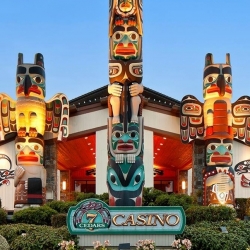Rep. Eric Pettigrew (D-Seattle) introduced House Bill 1975, which would legalize sports betting in tribal casinos, to the Washington House of Representatives earlier this month. HB 1975 proposes to legalize pro and college sports betting at the tribal sportsbooks.
On Thursday, February 14, the House Committee on Commerce and Gaming plans to discuss the benefits and drawbacks of tribal sportsbooks. House Bill 1975 would receive a big boost if the hearing on Thursday goes well.
The bill, which is sponsored by House Majority Caucus Chair Eric Pettigrew and seven other Washington lawmakers, was introduced on Friday. One interesting twist is HB 1975 calls for the legalization of online sports betting while inside tribal facilities.
Washington is the only state in the Union to have banned any form of online gambling. While most other states have not legalized and regulated online gambling, it is a Class C felony in Washington.
Chris Steans on Sports Betting
One state regulator predicts that tribal sportsbook legalization could open the door for sports gambling’s spread throughout the state. If so, it might mean online gambling is decriminalized. A closer look at the claims by that state official, Chris Stearns of the Washington State Gaming Commission, might illuminate why.
Chris Stearns sits on the Gaming Commission, as well as the Seattle Indian Health Board. Sterans also is an attorney for Hobbs, Straus, Dean, & Walker law firm in Seattle. Speaking from a position of influence and expertise, Commissioner Stearns said federal law allows for a wide range of legal gambling if it takes place on a tribal reservation.
The key is negotiations between a state and tribe. Stearns added, “The limits are actually not very big. The bill doesn’t say very much, but the way federal Indian gaming law works is, just as long as the state permits something it opens the door for the tribes to operate based on what they negotiate.”
Tribal Gaming Solution to Sports Betting
Native American casino affairs are more complicated under the Trump administration. An off-reservation satellite casino backed by two Connecticut tribal casino operators — Mohegan Sun and Foxwoods — and the Connecticut government were denied by the US Department of the Interior’s Indian Affairs Bureau. At the same time, a New Mexico tribe last year opened a sportsbook at an on-reservation casino without any reaction from state or federal authorities.
In the wake of the US Supreme Court’s repeal of a federal ban on sports betting — Professional and Amateur Sports Protection Act (PASPA) — over two dozens states have considered legalizing sports gambling in their jurisdictions. New Jersey, Delaware, Pennsylvania, Rhode Island, West Virginia, Mississippi, and New Mexico each have legalized sportsbooks in commercial casinos.
In all, only 11 states have not introduced some form of draft legislation to address sports betting. Lawmakers in New York and Arkansas have introduced bills to legalize sports betting, though each respective bill has a long way to go before passage. In each case, commercial casinos owned by private gaming companies would receive the benefit of the law — not tribal casinos.
House Bill 1975’s Preamble
House Bill 1975 suggests that tribal gaming authorities have the good reputation and experience to offer sports betting to Washingtonians. The bill begins, “Tribes have more than 20 years’ experience with, and a proven track record of, successfully operating and regulating gaming facilities in accordance with tribal gaming compacts.”
If Washington is successful with a tribal-focused form of sports betting, then readers can expect tribes across the country to push for similar laws in their states.
Mobile Sports Betting Apps
Another aspect of Washington’s proposed sports betting law which is different is the mobile sports betting aspect. While states are embracing land-based sportsbooks, they have been slower to embrace the Android and iOS sports betting apps and mobile sports betting in general. While New Jersey has live in-play betting, many others do not.
HB 19745 would authorize Washington sports bettors to use mobile phones, kiosks, or walk-up tellers inside Washington’s tribal casinos. It makes betting that much easier and more intuitive for the gamblers, but would require geo-fence — a virtual geographic boundary around Washington state which would be achieved by GPS or RFID technology (geolocation software).
What is a Geo-Fence?
The geo-fence is more important than ever in the wake of last month’s DOJ Office of Legal Counsel opinion which says interstate online gambling is illegal. While that ruling specifically noted online poker and online casinos — and their mobile counterparts — the DOJ’s opinion focuses on the interstate aspect of gambling online. Anything bets which cross state boundaries via telecommunications, even if those bets are handled in one single state, would be a primary target for federal oversight. As the various NSA scandals have shown, emails, texts, and transactions seemingly confined to a small area often cross state and international boundaries, so betting systems would have to assure no such breaches occur.
This is not the first time Washington state has considered innovative gambling laws. In the recent past, such innovations never were put into law, because they were voted down in the legislature. We might be able to tell if Eric Pettigrew’s sports betting bill is going to be different at Thursday’s hearing of the Commerce & Gaming Committee.

